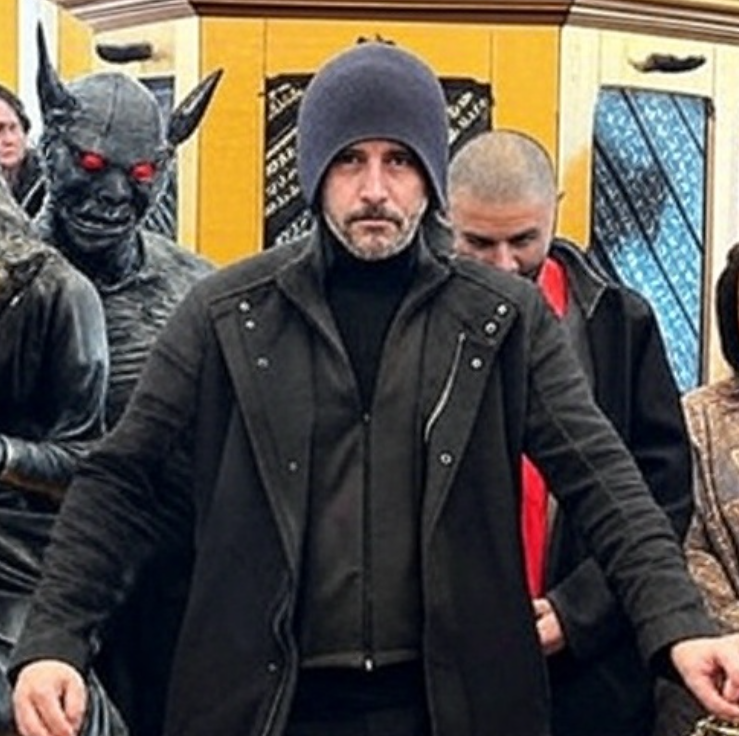
Abdullah Hashem Aba Al-Sadiq: A Rising Figure Sparking Antichrist Fears, and Why Pentecostal Churches Must Act

In the swirling chaos of modern spiritual movements, one name has emerged as a lightning rod for controversy: Abdullah Hashem Aba Al-Sadiq, the Egyptian-American leader of the Ahmadi Religion of Peace and Light (AROPL). Proclaiming himself the Qaim, the Second Mahdi, and even the new Pope, Aba Al-Sadiq has captivated thousands with a message that blends Islamic eschatology, Christian prophecy, and a bold claim to divine authority. But as his following grows—fueled by viral speeches on X, TikTok, and YouTube—alarms are sounding among Christian communities, particularly Pentecostals, who see in him a dangerous figure with unsettling parallels to the biblical Antichrist. With what some describe as a supernatural ability to sway followers, reminiscent of history’s most notorious manipulators, it’s time for Pentecostal churches to expose this man and his hypnotic influence before his reach extends further.
A Charismatic Leader with Grand Claims
Abdullah Hashem Aba Al-Sadiq, born in 1983, leads AROPL, a Shia-derived movement that claims he is the prophesied Mahdi, a savior figure in Islamic tradition, and the successor to Jesus and Muhammad. His followers, numbering in the hundreds with thousands more globally, point to his teachings—delivered through AROPL Studios and his YouTube channel, The Mahdi Has Appeared—as evidence of divine wisdom. They cite fulfilled prophecies, such as his alleged mention in the will of Prophet Mohammed, and his ability to answer centuries-old theological questions as proof of his legitimacy.
Yet, these bold claims have sparked fierce backlash. On Easter Sunday 2025, Aba Al-Sadiq’s followers took to the streets outside churches worldwide, from the United States to Bangladesh, proclaiming him the true Pope following the death of Pope Francis. His subsequent speech, which went viral, led many to label him a false prophet—or worse, the Antichrist. Critics argue that his assertions, including denying the completeness of the Quran and claiming to be a divinely appointed leader, align with the deceptive traits of the Antichrist described in 1 John 2:22, which warns of those who deny the Father and the Son.
The Supernatural Power of Persuasion
What sets Aba Al-Sadiq apart is not just his theology but his uncanny ability to draw followers. Social media posts on X describe him as wielding a demonic power to hypnotize people, likening his charisma to that of Adolf Hitler or other historical figures who captivated masses through oratory and presence. While such comparisons are hyperbolic, they reflect a growing unease about his influence. His speeches, delivered with calm conviction, have led thousands to pledge allegiance, with AROPL Studios reporting live conversions during broadcasts.
Pentecostal Christians, with their emphasis on spiritual discernment and the Holy Spirit’s guidance, are uniquely positioned to recognize this phenomenon. The movement’s history of confronting spiritual deception—seen in exposés like that of TB Joshua, whose miracles were revealed as manipulations—equips them to question Aba Al-Sadiq’s allure. Some Pentecostal leaders might argue that his persuasive power echoes the signs and wonders warned of in 2 Thessalonians 2:9, where the man of lawlessness deceives through false miracles. Though no concrete evidence proves Aba Al-Sadiq performs supernatural acts, his ability to inspire fervent loyalty raises red flags.
Why Pentecostal Churches Must Act
Pentecostalism, the fastest-growing segment of global Christianity, has long emphasized spiritual warfare and the need to expose demonic influences. From Nigeria’s Mountain of Fire Ministries to American charismatic networks, Pentecostals have confronted perceived threats, from conspiracy theories to false prophets. Aba Al-Sadiq’s rise demands their attention. His teachings, which challenge core Christian doctrines and embrace unorthodox views like tolerance for LGBT individuals within a religious framework, are seen by some as a deliberate attempt to undermine traditional faith.
X users, particularly within Christian circles, are already sounding the alarm, calling Aba Al-Sadiq a false prophet and spirit of the Antichrist cursed under Galatians 1 for preaching a different gospel. Posts warn that his movement is a battlefield of deception in the last days, urging believers to stand firm. Yet, these voices remain scattered, lacking the unified response that Pentecostal churches could provide.
A Call to Discernment, Not Fear
Not all agree that Aba Al-Sadiq is the Antichrist. Some sources, including AROPL-affiliated websites, argue that accusations against him stem from misinformation and misinterpretation of his teachings, which do not deny Jesus as the Messiah. Others, like a Medium article exploring his small but wild cult, dismiss the Antichrist label as unfounded, noting that his following, while fervent, remains modest.
Still, the rapid spread of his message in a digitally connected world cannot be ignored. Pentecostal churches, with their global reach and commitment to biblical truth, must lead the charge in examining Aba Al-Sadiq’s claims. This means preaching discernment, equipping believers to test spirits (1 John 4:1), and countering his influence with the gospel’s clarity. Pastors like Perry Stone, who have warned of demonic forces in politics, could rally their congregations to address this spiritual challenge.
The Stakes Are High
Abdullah Hashem Aba Al-Sadiq may not be the Antichrist, but his rise underscores a broader truth: in an age of viral misinformation and charismatic leaders, deception can flourish unchecked. Pentecostal churches, rooted in the power of the Holy Spirit, have a responsibility to expose falsehoods and protect the faithful. As Aba Al-Sadiq’s followers grow, so does the urgency for a response. Will the church rise to meet this moment, or will silence allow his hypnotic influence to spread further?
